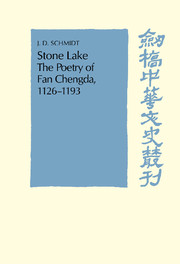Book contents
- Frontmatter
- Contents
- Preface
- Acknowledgments
- I Biography and critical study
- 1 The life of Fan Chengda
- 2 The formative period
- 3 Jiangxi wit and Fan Chengda
- 4 Buddhism and the dharma of sleep
- 5 The mountains and rivers
- 6 The fields and gardens
- 7 The poetry of patriotism
- II Translations
- Notes
- Bibliography
- Index
2 - The formative period
Published online by Cambridge University Press: 29 March 2010
- Frontmatter
- Contents
- Preface
- Acknowledgments
- I Biography and critical study
- 1 The life of Fan Chengda
- 2 The formative period
- 3 Jiangxi wit and Fan Chengda
- 4 Buddhism and the dharma of sleep
- 5 The mountains and rivers
- 6 The fields and gardens
- 7 The poetry of patriotism
- II Translations
- Notes
- Bibliography
- Index
Summary
Early imitative verse
Our biography of Fan Chengda has already touched on the development of his poetry, particularly as it relates to his political career. Before we can attempt to define the mature poetic style of Fan Chengda, which was largely formed by the time he was serving in Huizhou, we must examine the rather complicated path of evolution followed by his pre-Huizhou verse. Our study is greatly hampered by the loss of most of his prose works, in which he presumably discussed his experience as a poet and, perhaps, even the art of poetry in general, a loss not made up by the material in his poems, for, unlike many other Song poets, Fan almost never examines questions of literary theory in his verse. Thus, an investigation of Fan Chengda's early literary development must utilize three kinds of material: Fan Chengda's poems themselves, critical comments about his verse written by his contemporaries and later Chinese critics, and discussions of literary theory by those Southern Song poets who are closest to Fan in style and were known to have been in close association with him throughout his life. The third category of materials must obviously be used with great discretion, because we cannot always assume that Fan Chengda shared the ideas of his friends.
More of Fan Chengda's early poetry survives than that of his two most famous contemporaries, Lu You and Yang Wanli.
- Type
- Chapter
- Information
- Stone LakeThe Poetry of Fan Chengda 1126–1193, pp. 23 - 40Publisher: Cambridge University PressPrint publication year: 1992

